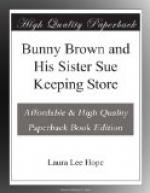“Take my advice and sell out before you’re sold out. It will be better that way. We can’t wait any longer. This is a good little store, but you don’t make it pay.”
“Maybe I could if my son Philip were to come back,” sadly said the old lady. “He’s gone after a legacy, and when he comes back——”
“There there, Mrs. Golden! It’s of no use to talk that way!” exclaimed Mr. Flynt. “You’ve been telling me about that legacy a long time. Why doesn’t it come?”
“I don’t know, Sir.”
“No. And I don’t believe it ever will come. We’ve waited as long as we ought, but I’ll give you a little more time, and that will be the last. If you don’t pay we’ll have to close your store. Think it over and sell out before you’re sold out.”
And then Mr. Flynt went out.
Bunny and Sue, who had been about to go home, looked at Mrs. Golden and felt sorry for her. They could see that she was feeling bad, and that she had been crying.
“What’s the matter?” asked Bunny.
“Not enough money—that’s the trouble,” was her answer. “Oh, dear, I don’t want to sell my store!” she said. “I want to keep it.”
“Have you got to sell?” asked Sue.
“Mr. Flynt says so,” came the reply, “because I owe him a lot of money I can’t pay. If business was only better I might keep my store going until Philip comes back with the legacy. Once we get that we’ll be all right! But if we don’t——”
Mrs. Golden put her handkerchief to her eyes. Then, seeing that she was making Bunny and Sue sad, she added:
“There now! Run along. Maybe I can get the money somehow. At any rate you children have been most kind to me. Run along now, and don’t mind a poor old woman.”
But Bunny and Sue did mind. They talked matters over on their way home and decided that something must be done. They wanted to help more than they had been doing, and Bunny thought of a way. As usual Sue agreed with him, for she was willing to do anything her brother did.
That evening after supper Bunny brought his little tin savings bank from a shelf in his room, and Sue brought hers. There was a great rattling as the pennies, dimes and nickels in the tin boxes clattered against the sides.
“My goodness! what’s going on?” cried Daddy Brown, looking up from the paper he was reading. “Are you two going to buy an automobile with all that money?”
“Will you please open my bank, Daddy, and see how much is in it?” asked Bunny.
His father, wondering what was “in the wind,” as old Jed Winkler would say, did so. With Bunny’s help the cash was counted. There was eight dollars and fifteen cents.
“I have more than that!” exclaimed Sue, and indeed she had, for Bunny had taken some of his money the week before to buy a top and a set of kite sticks. Sue had ten dollars and forty-six cents in her bank.
“What are you going to do with it?” asked Mrs. Brown, for she knew the children would not have gotten down their banks unless they had some plan in their heads.




